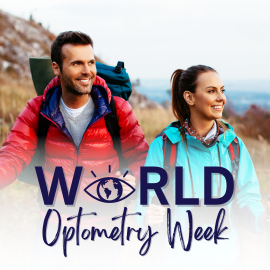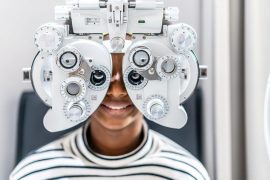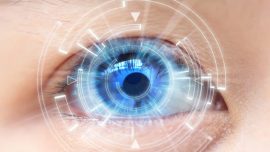AMD, eye condition, Eye Glasses, Eye Health, Eye Safety, Eyes
Vision is one of the most precious senses, yet millions of people worldwide experience Age-Related Macular Degeneration (AMD) and low vision, affecting their ability to see clearly. While these conditions can be challenging, early detection, proper management, and lifestyle adjustments can help preserve sight and quality of life. What is Age-Related Macular Degeneration (AMD)? AMD […]
Read
More
Eye Health, eye infections, Eye Safety, Eyes
March 17th — 23rd marks World Optometry Week, a global occasion dedicated to recognizing the invaluable contributions of optometrists in ensuring eye health and vision care. This week serves as a reminder of the essential role optometry plays in preventing vision impairment, detecting eye diseases early, and enhancing overall well-being through proper eye care. The […]
Read
More
exercise, Eye Health, Eye Safety, Eyes, Eyewear, Glaucoma, Nutrition
Our eyes play a crucial role in our daily lives, yet they are often overlooked when it comes to health care. The way we live, including our diet, exercise habits, and screen time, can significantly impact our eye health. Understanding the connection between lifestyle choices and eye health can help you maintain good vision and […]
Read
More
Eye Health, Eye Safety, Eyes, Glaucoma, vision loss
As we welcome a new year, it’s the perfect time to focus on your health—and that includes your vision. January marks National Glaucoma Awareness Month, a dedicated effort to educate individuals about the dangers of glaucoma, a leading cause of irreversible blindness worldwide. Glaucoma has been aptly named the “silent thief of sight” because it […]
Read
More
Eye Glasses, Eye Health, Eye Safety, Eyes, Eyewear, Sunglasses
Our eyes are one of the most vital yet vulnerable parts of our body and protecting them should be a top priority. Whether you’re at work, playing sports, or even performing everyday tasks, taking steps to safeguard your eyes can prevent injury and maintain your vision for life. Here’s why eye safety is crucial and […]
Read
More
Eye Health, Eyes, LASIK
Imagine waking up each day with clear, unassisted vision—no glasses, no contact lenses, just crisp, natural sight. LASIK (Laser-Assisted In Situ Keratomileusis) offers this freedom by correcting common vision problems and providing a long-lasting solution to your vision needs. Here’s a closer look at how LASIK can transform your vision and enhance your daily life. […]
Read
More
Eye Health, Eyes
As we move through 2024, advancements in technology and shifts in healthcare priorities are bringing about significant changes in eye exams. Keeping up with these trends can help you ensure the best care for your vision. Here’s a look at the latest trends in eye exams this year. 1. Increased Use of AI and Machine […]
Read
More
Cataract Surgery, cataracts, Eye Health, Eyes, IOL
Cataract surgery is one of the most common and effective procedures performed to restore vision. In recent years, advancements in technology have significantly enhanced the precision and outcomes of cataract surgery, offering patients improved safety, quicker recovery, and better visual results. Here’s a brief overview of why advanced technology is crucial in modern cataract surgery. […]
Read
More
Eyes, kids
As we celebrate Children’s Eye Health and Safety Month this August, it’s the perfect time to focus on the importance of eye care for children. Eye health is not only vital for clear vision but also plays a crucial role in a child’s overall development and academic success. Ensuring that children maintain good eye health […]
Read
More
Blog Category, Dry Eye Disease, Dry Eye Syndrome, Eyes, kids, reading problems, The Eye Associates, tired eyes
Electronic devices. Our kids were raised with them. They can’t imagine life without them. And neither can we. But how are they affecting our kids’ eyes? We know first hand the strain that we feel after a long period at the computer. But what about our kids? According to the American Optometric Association, 83 % […]
Read
More










